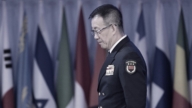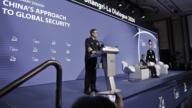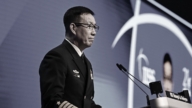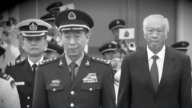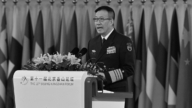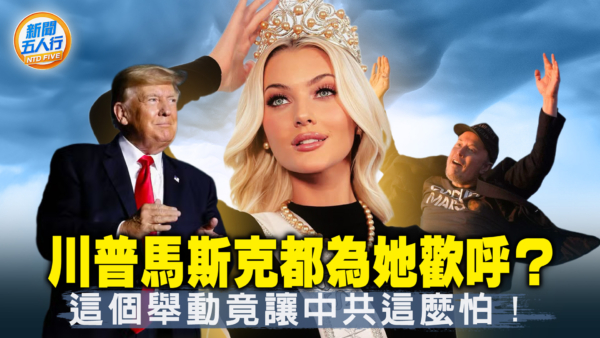【新唐人2013年06月25日訊】近來,大陸銀行資金緊張,成為世界輿論關注焦點,中短期限資金利率紛紛創下歷史新高,堪比高利貸,整個金融市場籠罩在一片緊張氣氛中,不少分析家預測,中國將會爆發大規模經濟危機。令外界猜測不已的是,這次中央銀行沒有如往年般的「出手相助」,而是選擇了冷眼旁觀。
6月以來,大陸金融系統陷入流動資金匱乏的危機,各大金融機構奔走互問還有錢嗎?同時,各銀行間同業拆借利率(shibor)飆升。而被銀行界市場人士戲稱為「央媽」的央行,卻選擇了按兵不動,市場議論紛紛。
香港《蘋果日報》指出,溫家寶主政時期,銀行間市場資金如果出現短缺,央行通常會儘快投放資金,平抑利率, 2007年的金融危機之後,中共當局更是放出4萬億人民幣的貸款。銀行早已習慣於將央行作為資金的最後來源。但這次,「央媽」為何突然斷奶,拒絕救市?
對此,金融專家分別從經濟和政治兩方面進行了解析。
中國金融分析師任中道:「如果央行再進行公開市場操作的話、往市場倒水的話,就會更加的推高房地產泡沫。所以央行沒有甚麼操作。它就在等著,在進行試探,看市場最後的反應。它做一個賭博,如果不行的話,等到差不多7月份,它如果能挺得住就挺,挺不住就公開市場操作,所謂的降準、降息。」
《蘋果日報》還引述英國《金融時報》日前發表的評論指出,大陸金融業的錢荒主要是因為「李克強經濟學」發威造成。6月中,李克強甚至接連公開聲明,不會再輕易發錢,要靠啟動貨幣信貸存量來刺激經濟。文章分析,李的強硬,正是為了逼迫各大銀行從泡沫中主動脫身。那麼,在他任期之初,先消除了經濟中的危險因素,以免未來十年踩中地雷。
國務院發展研究中心的經濟學家李佐軍,早在2011年就預測到了﹕在2013年7、8月,中國大陸將發生經濟危機。
李佐軍說:「新一屆政府領導將面臨一個抉擇,兩種選擇。一種選擇是,把之前的經濟泡沫再接過去,再精心維護,最遲能維護到2015年,或者2016年,但那個時候就是一個更大的危機。那個時候爆發的危機的責任在誰,誰也說不清楚。第二種選擇,就是不接這個泡沫,上臺之後很快讓這個泡沫給破掉。破掉之後,首先會帶來一段時間的痛苦,但對於新的領導人來說是好事,因為責任很清楚,不是他們造成的,是前面造成的。顯然,李克強選擇了第二種。」
另一方面,專家認為,中央和地方的矛盾,也是「央媽」變「後媽」的一個主要原因,而且早在政府換屆前,雙方的矛盾就已經逐漸顯露。
任中道:「從政治角度來說,現在中共的地方政府和中央是為一種對抗狀態。也就是所謂的諸侯割據,對抗上面的中共,李克強的方法也是敲山振虎,給那些不聽話的小弟們給點顏色,你不聽話嗎?我不給你錢,沒有錢,中共的地方政府也就完蛋了。」
據香港《爭鳴》雜誌報導,在去年底的中央經濟工作會議上,28個省市地方政府要求中央一次性註銷4萬多億已到期或者已拖欠的債務,並要求中央一次性調撥十年規劃的資金,充實到各地政府管轄銀行。當時即將卸任的前總理溫家寶一口回絕說,地方債不能一筆勾銷,欠債是要還的,並表示,沒有權利調撥大量資金來填補地方銀行的惡性壞賬。
業內人士認為,雖然中央態度強硬,但如果銀行真的發生系統性危機,中央也不會坐視不管,最糟糕的就是大量印刷貨幣,導致通貨膨脹、貨幣貶值﹔或者,動用巨大外匯儲備來填補所有的財政漏洞。
採訪編輯/張天宇 後製/李月
No Help from China’s Central Bank Facing Capital Shortage
Banks in China have been experiencing a capital shortage,
which has become a global focus of interest.
Interest rates of short-term and mid-term funding
have hit record highs, comparable to usury.
The entire financial market has a tense atmosphere,
and many analysts predict that a large-scale
economic crisis will outbreak in China.
The People’s Bank of China (China’s central bank)
hasn’t “extended a helping hand” as it did in the past, but chooses to just stand by.
Since June China’s financial system has run into
a crisis of a lack of circulating capital,
with some major financial institutions asking
around for money.
Meanwhile, the interbank offered rate is soaring.
However, China’s central bank, often called the “Mother Bank,”
has chosen to do nothing, which has provoked much discussion.
Hong Kong’s Apple Daily said when Wen Jiabao was in power,
China’s central bank would quickly invest capital
to stabilize interest rates when there was a shortage of funds.
After the 2007 financial crisis, the Chinese Communist Party
(CCP) even invested a 4 trillion yuan ($650.7 billion) loan.
Banks are used to having the central bank as the ultimate source.
However, why doesn’t the “Mother Bank” bailout this time?
In this regard, financial experts analyze the situation from
both the economic and political perspectives.
China financial analyst, Ren Zhongdao: “If the central bank
conducted open market operations and poured money in,
it would push the real estate bubble even further.
So the central bank hasn’t done anything.
It’s waiting to see the final response of the market;
it’s making a gamble.
If thing’s don’t turn out well, it’ll wait until around July.
If it can hold on, it will;
otherwise it will take action to lower the interest rate.”
Apple Daily quoted the UK’s Financial Times as saying that
the “money shortage" in China is mainly because of the
“Li Keqiang Economics."
In mid-June Li Keqiang even make a public statement
that China will no longer invest money easily.
China will “launch a money and credit reserve”
to stimulate it’s economy.
The Apple Daily article says that Li makes a tough stance to
force major banks to proactively get away from the bubble,
thus eliminating the risk factors in the economy
at the start of his term.
Economist Li Zuojun at the Development Research
Center of the State Council said, as early as 2011,
he predicted China will have an economic crisis
around July and August of 2013.
Li Zuojun: “The new leadership faces two options:
One is to take over the economic bubble passed to them,
and meticulously maintain it until 2015 or 2016,
when there will be an even greater crisis,
and no one would be clear who is responsible for that.
The second option is to not take the bubble,
and have it burst once they take the office.
It will bring some pain for a while.
But to the new leaders, this is a good thing,
because it’s clear they aren’t responsible for it.
Obviously Li Keqiang chose the second option.”
Experts also believe the conflict between the
central and local governments is another reason
for “Mother Bank” to suddenly act as a “step-mother.”
The contradiction between the two sides has gradually
emerged as early as the power transition.
Ren Zhongdao: “From a political point of view,
China’s local government and central government
are in the state of conflict.
Li Keqiang is trying to warn the local officials,
giving the message: If you don’t listen, I won’t give you money,
and without money, local governments will be finished."
According to Hong Kong’s Chengming magazine, during the
“Central Economic Work Conference" held at the end of 2012,
28 provincial and city level local governments asked
the central government to put in over 4 trillion yuan to clear their default debts,
and allocate funds from the “10-Year Plan” to local banks.
The then premier Wen Jiabao refused the request.
He said local debt can’t be wiped out, “debt should be repaid,"
and expressed he has no right to allocate a large sum of money
to fill local banks’ vicious circle of bad debts.
Although the central government takes a tough stance,
industry experts say that if banks really have a systemic crisis,
the central government won’t sit idly by.
The worst result would be large scale money printing,
leading to inflation and currency devaluation,
or using huge foreign exchange reserves to fill financial holes.




